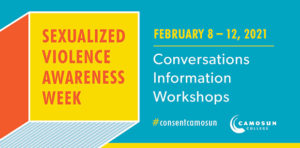Camosun College is holding their annual Sexualized Violence Awareness Week from February 8 to 12. The week, which is organized by the college’s Office of Student Support and the Camosun College Student Society, is a little different this year due to it being all online; there’s no getting around that, says Camosun student support manager Stephanie Pedneault.
“It forces us to be creative and think about what the priority is in terms of our message,” says Pedneault. “Camosun as a whole is really committed to the prevention of sexualized and gender-based violence.”
The college is using social media platforms “in a more visible way” this year. Using social media stories and the Instagram live function, students can hear conversations with various people during the week.
“[Camosun student support manager] Jenny [Holder] and I are offering workshops—virtually, of course—to our staff and faculty around how to respond effectively to disclosures of sexualized violence,” says Pedneault. “It has forced us to switch gears a little bit, but we’re feeling hopeful that it will still reach a wide audience.”
The college will also run a social media story focusing on how students can connect with the Office of Student Support, and how that department can support students.
“We translated it into an Instagram story that people can just flip through with the knowledge of what it means to get in touch with us, how we can support students, either with an informal process, or a formal process, or just to support them with where they’re at,” says Pedneault.
As part of the week, in partnership with the BC Centre for Women In Trades and Camosun’s Electrical Foundations program, the college is hosting Be More than a Bystander, a training workshop for Electrical Foundation students. The workshop will focus on how to intervene in a safe way when witnessing instances of potential sexualized violence.
“It’s a workshop that is facilitated by men and the target audience is men,” says Pedneault. “We’ve opened it up to a diverse audience, because we have a lot of students in that program that are not men.”
With more and more online formats being used for dating, that means that breaches of consent, sexual violence, or sexual harassment can show up there as well, says Pedneault.
“It might be in a sexting relationship, a sharing of pictures that are unwanted, or not given freely with consent,” says Pedneault. “Instances of stalking online are cause for great concern and something that we know our students are experiencing.”
Holder says that as a first step for students who need support, there’s counselling available at Camosun and in the broader community, and those services are also available to the recipient of an allegation.
“It just depends on what the best approach is for them, what they need, whether it’s mental health or whether it’s some kind of behaviour intervention that they need,” she says. “That’s best looked at individually, but we certainly will help to coordinate their care as well. Folks who cause harm need to be cared for… [That] could be a radical thing to say. All people involved need to be respected. It’s a very important piece.”
All material can be shared and viewed on social media with the hashtag #ConsentCamosun, or see camosun.ca/services/sexual-violence/consent-camosun.html for more information.

